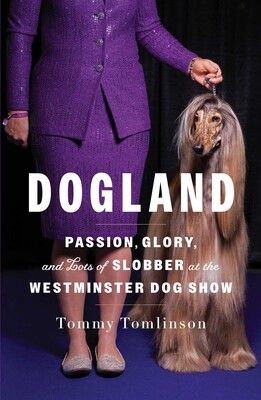Animal Behavior
"Dogland": The Convoluted World of Dog Shows and Best of Breed
Tommy Tomlinson's new book focuses on whether primped dogs are happy.
Posted April 23, 2024 Reviewed by Michelle Quirk
Key points
- Tommy Tomlinson writes about the strong bond that humans have with dogs and how it has changed over the years.
- How we connect with dogs tells us something about how we connect with one another.
- He came to think of the people in the dog-show world as similar to Deadheads.

Dog shows are very popular events in which dogs who are thought to be perfect ambassadors for their breed are paraded around by their humans and judged for just how good of a match they are for accepted breed standards. In his latest book called Dogland: Passion, Glory, and Lots of Slobber at the Westminster Dog Show, Pulitzer Prize finalist Tommy Tomlinson covers many different sides of the world of dog shows, in particular the Westminster Dog Show, and wonders whether or not dogs really enjoy them and also enjoy the lives we offer them outside of these sorts of events.1
Marc Bekoff: Why did you write Dogland?
Tommy Tomlinson: I was watching a dog show one night, years ago, and a thought popped into my head: Are those dogs happy? After all, they live in a world that from the outside looks so artificial. Most dogs aren’t primped and groomed and pranced around a show ring. It made me wonder if the dogs enjoyed that life. And that led to a bigger question: Do dogs, in general, enjoy the lives we have made for them?
That led me to immerse myself into what I came to call Dogland—the world of dog shows—and also to learn what I could about the history of the bond between dogs and people. And as I dove in, I thought the best way to tell those stories was to follow a champion show dog and handler as they tried to win the Westminster Dog Show—the dog show world’s Super Bowl.
MB: How does this book relate to your background and general areas of interest?
TT: Subcultures are endlessly fascinating to me. I love diving into a world I don’t know much about and learning its ways, its lingo, what its people care about and why. The world of show dogs has its own rules and its own language. For example: the word “bitch,” in Dogland, just means a female dog. You hear it all the time and nobody thinks twice about it.
I came to think of the people in the dog-show world as similar to Deadheads—traveling around the country week to week, gathering at the venue together, chasing a dream.
MB: Who do you hope to reach in your interesting and important book?
TT: I hope there’s something in it for everybody. If you’re involved in dog shows or if you’re a dog lover, Dogland is right in your wheelhouse. But I think there’s something meaningful in the book even if you don’t love dogs. At its core the book is about connection … how we connect with dogs tells us something about how we connect with one another.
MB: What are some of the major topics you consider?

TT: Dogland looks at the whole history of humans’ relationship with dogs, and how it has changed over the centuries. Dogs are a human invention—we bred them from wolves, split them off into breeds, and tailored them to do the jobs we needed them to do. Those jobs used to involve physical labor; now, mostly, we need dogs as companions and friends.
Dog shows reflect the changing way we look at dogs now. They used to be a way to compare hunting dogs, and now they’re a showcase for all sorts of groomed and primped exotic breeds. The breeding of purebred dogs comes with its own problems, and the book delves into that as well.
But in the end, it all comes back to that bond. Why do we care about dogs so much? Why do they seem to care so much about us? And why does that bond matter?
MB: How does your book differ from others that are concerned with some of the same general topics?
TT: Some books are about the art of competing in dog shows, other books are about the science of dog behavior, and still other books are about the affection people have for their dogs. My goal was to touch on all those things in a way that brings all those ideas together.
MB: Are you hopeful that as people learn more dog shows they will become more concerned about what it means for the dogs and their humans?
TT: I do hope people will think a little harder about what the whole idea of a purebred dog entails—a purebred dog is basically an inbred dog, and inbreeding leads to a host of medical issues. Dog shows are about chasing perfection—finding the dog that is the ideal representation of its breed—and that’s not always healthy.
At the same time, I found that nearly all the people in the dog-show world love and care about dogs. As with most interesting and worthwhile topics, it’s complicated.
References
In conversation with Pulitzer prize finalist Tommy Tomlinson. Tommy is the host of the podcast “SouthBound” at WFAE, Charlotte’s NPR station, and he also does weekly commentaries for the station. He also has a Substack newsletter called The Writing Shed.
1. There is much more to this book that is worth noting. From the publisher's website: "Tomlinson’s limitless curiosity about people and dogs reaches far beyond the show tents and into the ordinary lives of dogs. We hear from experts who have discovered new insights into how dogs and humans formed their bond—and how that bond has changed over the centuries. We discover the fascinating origins of different dog breeds, learn about the elaborate breed standards that determine an ideal show dog, and consider the health issues that can arise in purebred dogs. We also meet dog lovers who applaud every dog, regardless of breed, simply for being themselves, such as WeRateDogs, the social media phenomenon with millions of followers, all for posts celebrating the day-to-day goofiness in most dog owners’ lives."




